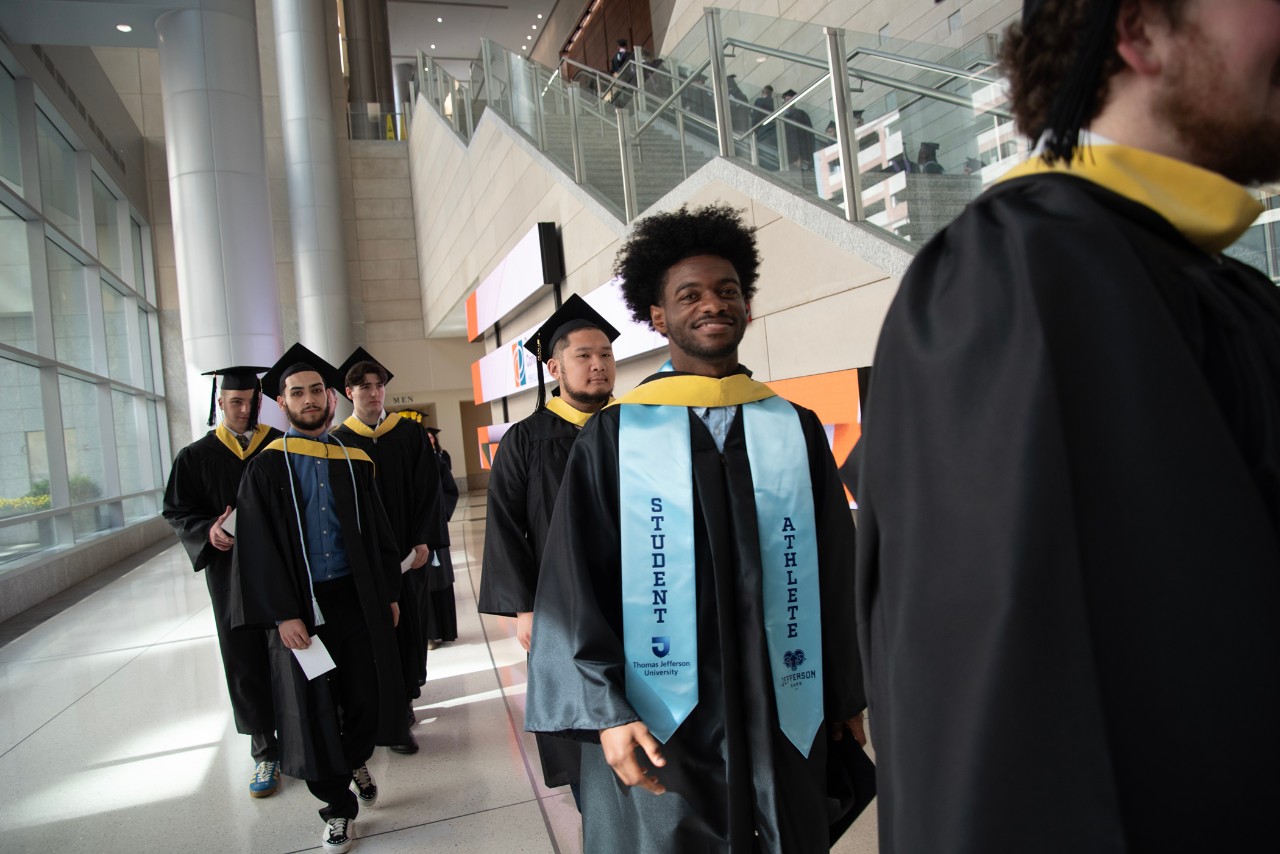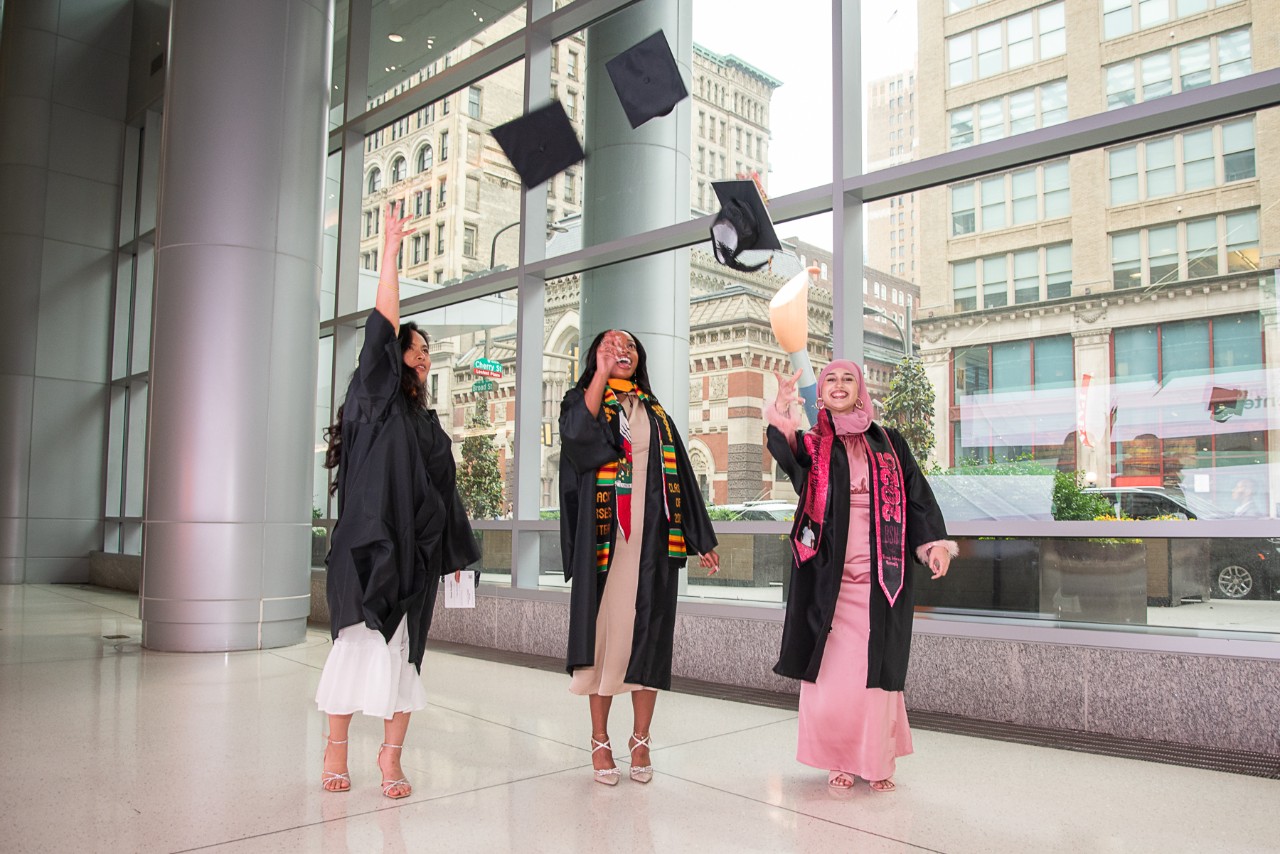A recent graduation event at Thomas Jefferson University in Philadelphia drew a lot of public notice, and for reasons no one would have wished. A situation unfolded during the ceremony for nursing students that caused quite a stir, leading to an immediate and heartfelt apology from the university itself. It was a moment that, you know, really captured attention across various social media places, sparking conversations about how important it is to get things just right, especially on such a special day for those celebrating their achievements.
This particular occasion, meant to be a joyous send-off for new nursing graduates, saw a presenter mispronounce names in a way that, well, became the subject of widespread sharing. Videos of the event started circulating very quickly, showing the difficulties faced by the person announcing each student as they stepped forward. The university, seeing the widespread reaction, quickly spoke up about what happened, trying to make things right for everyone involved, so it's almost a situation where you can feel the weight of the moment.
The university's leadership has since offered their deepest regrets to the students, their families, and all their dear ones who were there or watching. This whole situation, which many people saw as a bit of a blunder, has certainly put a spotlight on the care and attention that goes into these significant life events. It's a reminder, perhaps, that even with the best intentions, sometimes things can go awry, and the way an organization handles such moments truly matters, that's for sure.
- Jack Austin Movies
- Is Home Goods Open Christmas Eve
- Open Toe Low Heel Pumps
- Nightbitch Movie Poster
- Magazine Beads
Table of Contents
- Understanding the Recent Thomas Jefferson Commencement Announcer Incident
- What Happened with the Thomas Jefferson Commencement Announcer?
- How Did the University Respond to the Thomas Jefferson Commencement Announcer's Errors?
- The Impact of the Thomas Jefferson Commencement Announcer's Missteps
- Why Did the Thomas Jefferson Commencement Announcer Struggle with Names?
- The Wider Reaction to the Thomas Jefferson Commencement Announcer's Performance
- What Could This Mean for Future Thomas Jefferson Commencement Announcer Events?
- Reflecting on the Thomas Jefferson Commencement Announcer Event
Understanding the Recent Thomas Jefferson Commencement Announcer Incident
The recent graduation ceremony at Thomas Jefferson University, a place of learning in Philadelphia, became the subject of many discussions after an issue with the person announcing the graduates. This particular event, held for the nursing students, was meant to be a proud moment for all involved, yet it took an unexpected turn. The university quickly offered an apology to those affected, which included the students themselves, their families, and other cherished people who were there to cheer them on. It was a situation that, in some respects, caught many by surprise, leading to a lot of online sharing and comments.
Reports and videos that spread widely showed that the speaker at the commencement had a really tough time saying the names of some of the people graduating. This difficulty with pronunciation, you know, caused a bit of a stir, and it was something that the university felt needed to be addressed right away. The errors were noticeable enough that they captured the attention of many viewers, both those present and others watching the recordings later. So, it's almost like the entire event took on a different kind of focus for a short while.
The university made it clear that they understood the significance of this day for their students and their dear ones. The apologies were extended to acknowledge the feelings of anyone who felt let down by the missteps during such a meaningful occasion. This response from the university shows their wish to address the situation openly and to express regret for any upset caused by the way the names were spoken. It was, basically, a moment that required a swift and clear communication from the institution.
- Eugenia De York
- Kirk Hammett Wife
- Garth Brooks Mom Song
- Serena Van Der Woodsen Fashion
- The Playboy Twins
What Happened with the Thomas Jefferson Commencement Announcer?
During the graduation event for the nursing students at Thomas Jefferson University, the person tasked with calling out the names of the graduates encountered some significant trouble. This speaker, who was meant to introduce each student as they received their recognition, mispronounced many names. For example, instead of saying "Molly Elizabeth Camp," the speaker apparently said something that sounded like "Mollina—zabeth—cap." This kind of error, you know, happened more than once throughout the ceremony, leading to a growing sense of unease among those watching.
The difficulties with the names were quite noticeable, and people in the audience, as well as those watching recordings later, picked up on them very quickly. Videos from the ceremony began to spread on social media platforms, showing these moments where names were not spoken correctly. These clips, you know, soon became a topic of broad discussion, with many people commenting on the situation and sharing their thoughts about it. It was, in a way, a moment that became unintentionally famous for its unexpected turns.
The recordings showed the announcer struggling with various names, leading to what some people described as a "hilarious viral video," though for the graduates and their families, it was probably less funny and more disappointing. The errors were not just isolated incidents; they seemed to happen frequently enough to become a defining feature of the ceremony for many viewers. This widespread sharing of the videos, you know, put the university in a position where they had to speak about the situation publicly and address the concerns that arose.
How Did the University Respond to the Thomas Jefferson Commencement Announcer's Errors?
Following the widespread attention the commencement event received, Thomas Jefferson University quickly issued a public apology. This apology was meant for the students who were graduating, their families, and all the loved ones who were there to celebrate. The university acknowledged the difficulties that happened during the ceremony, especially regarding the mispronunciation of names. It was a quick response, you know, showing that they understood the weight of the situation and the feelings involved.
The university's statement expressed deep regrets from its leadership and faculty. They wanted to make it clear that they were sorry for the errors in speaking the names of several of their graduating nursing students. This official communication aimed to address the concerns that had arisen from the viral videos and the public's reaction. It was, basically, a way for the institution to take responsibility for what happened and to show their care for the people affected.
The apology came out on Friday, after the Thursday ceremony, indicating a quick turnaround in their official communication. The university's message made it clear that they were addressing the "gaffe" that took place, which is a mild way to describe what many saw as a significant problem. This open acknowledgment, you know, was a step toward reassuring their community that they recognized the importance of such events and the need for them to go smoothly. It's almost like they wanted to put things right as quickly as they could.
The Impact of the Thomas Jefferson Commencement Announcer's Missteps
The mispronunciations during the graduation ceremony had a noticeable effect on the atmosphere of the event. For many students, hearing their name spoken incorrectly during such a significant moment could have been upsetting. This day is a culmination of years of hard work and dedication, and the moment a graduate's name is called is meant to be a highlight, a moment of individual recognition. When that moment is altered by errors, it can, you know, take away from the joy and pride that should be present.
Beyond the immediate impact on the graduates, the videos of the incident spread widely across social media. This meant that a moment intended for private celebration became a public spectacle, viewed by countless people who were not even present. The university found itself "under fire" from the public, facing comments and criticism about the quality of the ceremony. This kind of widespread attention, you know, can be challenging for any institution, as it puts their operations and their care for their students under a very bright light.
The situation even led some people to question if the event was real or if it was some kind of planned performance or "skit." This shows the unusual nature of the errors and how surprising they were to many viewers. The fact that a TikTok creator, @colleenb415, captured the "cringey" moments and shared them, you know, further fueled the viral spread. The incident became a talking point, not just about the university, but about the importance of getting names right in formal settings, especially those that mark big life achievements.
Why Did the Thomas Jefferson Commencement Announcer Struggle with Names?
The university's explanation for the many mispronounced names during the ceremony pointed to an issue with how the phonetic spellings were provided to the speaker. This suggests that the problem might not have been with the announcer's ability to read or speak, but rather with the information they were given to work from. When names are not written out clearly in a way that helps with pronunciation, you know, it can create difficulties for anyone trying to say them correctly, especially in a fast-paced environment.
It seems the system or method used to prepare the names for the announcer might have had some flaws. If the phonetic guides were incorrect, incomplete, or simply confusing, it would make it very challenging for anyone, even a skilled speaker, to get every name right. This kind of technical or preparatory issue, you know, is something that institutions often try to prevent with careful planning and checks. It was, in a way, a breakdown in the process leading up to the main event.
The university's apology mentioned that the errors were "due to an issue with phonetic spellings." This implies that the problem originated before the announcer even stepped onto the stage. It suggests that there was a disconnect between how the names were collected and how they were presented for pronunciation. This detail, you know, shifts some of the focus from the individual speaker to the broader organizational process that supports such a large event. So, it's almost like the system itself needed a bit of a review.
The Wider Reaction to the Thomas Jefferson Commencement Announcer's Performance
The reaction to the Thomas Jefferson commencement announcer's performance was quite widespread, reaching far beyond the immediate audience at the ceremony. Videos of the mispronunciations, as mentioned, gained a lot of popularity on social media platforms, with people sharing them and adding their own comments. This public sharing meant that the university's graduation event became a topic of conversation for many who had no direct connection to the school or its students. It was, in a way, a moment that captured the attention of a very large online audience.
Many viewers expressed a mix of amusement and sympathy. Some found the errors genuinely funny, especially the more dramatic mispronunciations like "Mollina—zabeth—cap." Others felt a sense of sadness or disappointment for the graduates, understanding how important that moment is for them. The comments online ranged from lighthearted jokes to more serious discussions about the need for accuracy and respect during such formal occasions. This kind of varied response, you know, shows how different people can interpret the same event.
The incident also led to a lot of attention for Thomas Jefferson University itself, perhaps not the kind of attention they would typically seek. The viral nature of the videos meant that the university's name was being mentioned frequently in online discussions, often in connection with the mispronunciations. This public scrutiny, you know, highlights how quickly information spreads today and how institutions must be ready to respond to unexpected situations that gain public visibility. It's almost like the whole internet was watching, in a sense.
What Could This Mean for Future Thomas Jefferson Commencement Announcer Events?
Looking ahead, this situation with the Thomas Jefferson commencement announcer could certainly lead to some changes in how the university prepares for its future graduation ceremonies. The university has already shared information about its 2025 commencement ceremonies, which suggests they are always planning well in advance. Given the recent experience, it is very likely that they will put extra care into ensuring that such issues do not happen again. There will, you know, probably be a much closer look at how names are gathered and how they are given to the person announcing them.
One might expect that the process for checking and double-checking phonetic spellings will become much more rigorous. This could involve having multiple people review the names, or perhaps using technology to help with pronunciation guides. The goal would be to make sure that every student's name is spoken clearly and correctly, honoring their achievement in the way it deserves. It is, basically, a chance for the university to learn from what happened and make their future events even better, so that's a positive aspect.
The university will probably want to make sure that the next Thomas Jefferson commencement announcer is well-prepared and has all the tools needed to succeed. This might mean more practice sessions, clearer instructions, or even a different approach to how the names are presented on the day of the event. The aim, you know, would be to prevent any repeat of the viral moments and to ensure that the focus remains entirely on the graduates and their significant accomplishments. It's almost certain they'll be very careful moving forward.
Reflecting on the Thomas Jefferson Commencement Announcer Event
The incident involving the Thomas Jefferson commencement announcer serves as a reminder of how important every detail is during significant public events, especially those celebrating personal milestones. For students, graduation is a moment they have worked towards for a long time, and the calling of their name is a very personal and special part of that day. When something goes wrong in that moment, it can, you know, really stand out and affect the overall memory of the occasion for the people involved.
The university's swift apology shows an understanding of the impact such errors can have on the feelings of students and their families. It highlights the importance of accountability and quick communication when unexpected problems arise. The fact that videos of the incident spread so widely also points to the power of social media in amplifying events, making even small missteps visible to a very large audience. This kind of public exposure, you know, means that institutions are always under a bit of a spotlight.
Ultimately, the situation with the Thomas Jefferson commencement announcer, while challenging, provides a chance for reflection and improvement. It encourages organizations to review their procedures and to consider every aspect of their public events from the perspective of those they are meant to honor. Ensuring that every name is spoken with care and accuracy is, basically, a sign of respect for the hard work and dedication of each graduate. It's a lesson, perhaps, in the fine details that make a big difference.


